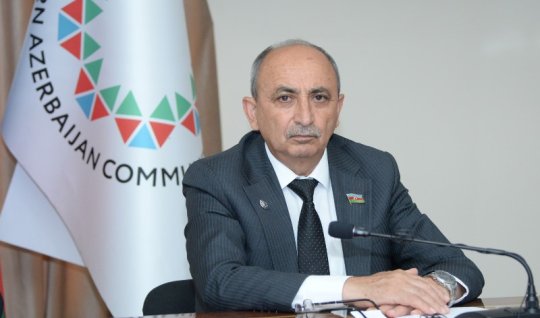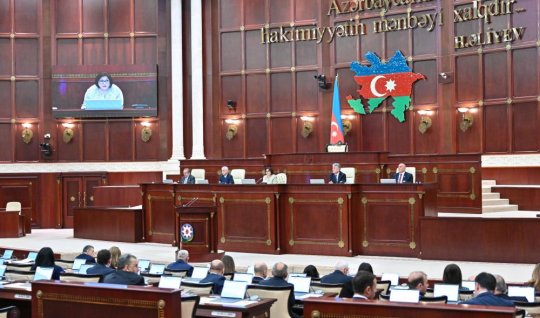Is Azerbaijan becoming a NATO member..?

The world has long left behind the old paradigms of the Cold War. However, the security architecture is still forming around NATO, established in 1949. Although the global balance of power has shifted, there is no alternative to NATO in terms of a collective security model. This format is explained by technological superiority, financial strength, and the legitimacy provided by political unity. We can say that NATO is now the core of the global influence mechanism in the world.
The defense strategies of the US and European countries, especially after the Russia-Ukraine war, have strengthened NATO's role as a political alliance as well.
In recent years, the alliance's expansion has covered almost all of Europe. Countries that were part of the former socialist bloc, Poland, Czechia, Slovakia, Hungary, Romania, Bulgaria, and the Baltic republics, are full members of NATO.
Now it is the turn of the former USSR republics. Georgia has been on the threshold of NATO's door since 2008, Armenia has started a new dialogue with the West, and Ukraine has practically integrated to the level of joint military operations with NATO.
Currently, the Alliance's attention has already turned to Central Asia and the South Caucasus.
This process further tightens the narrowing security circle around Russia. The cooperation formats of Georgia, Ukraine, Moldova, and even Kazakhstan with the West are isolating Moscow. Analysts even view the unofficial Russia-Kazakhstan talks in Moscow yesterday from this context. China's embrace of Kazakhstan as its most preferred country in the world is not desirable for Russia at all.
Belarus is still hesitant, but a part of public opinion there already supports rapprochement with Europe.
In this situation, the last irony facing the Kremlin might sound like this: “There is no other option but to join NATO.” Because Russia's alternative ally formula does not work on military, economic, and diplomatic fronts. More precisely, Russia cannot be an ally. The latest example of this is Russia's stance in the Israel-Iran confrontation.
NATO's expansion is not just a European issue. China perceives this trend as its “global encirclement.” The Alliance's cooperation with Australia, Japan, and South Korea in the Asia-Pacific region worries Beijing. China refrains from military expansion to protect its economic hegemony, but it stiffens its diplomatic reactions.
India, however, tries to maintain a policy of balance. On one hand, it establishes technological cooperation with the West, including the US and NATO, while on the other hand, it does not sever its historical energy and arms ties with Russia. However, India also understands that NATO's standards and technologies will prevail in the future security system.
Azerbaijan is not a NATO member, but it is one of the alliance's most active partner countries. Baku has been a participant in the “Partnership for Peace” program since 1994 and participates in NATO's joint exercises every year. This cooperation has now entered a new phase:
There is also a Turkey factor in this matter. Turkey, Azerbaijan's strategic ally and brotherly state, is a full member of NATO. This gives Baku a unique advantage in its relations with NATO.
Another point is related to regional stability. After the Karabakh war, a new balance of power has formed in the region, and the visits of NATO envoys to Azerbaijan indicate the West's growing interest in this balance.
Energy security also has a special share in this direction. Azerbaijani gas is of great importance in Europe's energy supply, which aligns with NATO's strategic interests.
After the 44-day war, NATO saw that Azerbaijan has a very strong army. This army attracts a lot of attention from the Alliance.
It appears that Baku, having established the political configuration in this manner, is not rushing into any matter yet. The main issue for Azerbaijan is to balance political neutrality with Western integration. Rapprochement with NATO could provide Baku with international security guarantees. However, official Baku is also aware that this step could strain relations with Moscow. Therefore, Azerbaijan, adapting world politics to its national interests, appears insistent on balanced steps.
There is also a reality that, regardless of our wishes, the world is losing its multipolar military appearance. It is returning to a unipolar NATO orbit. Russia is losing its defense line on its borders, and China, despite its economic power, faces the risk of strategic isolation. India, meanwhile, is still searching for balance.
A historic opportunity is emerging for the South Caucasus. The opportunity arises to sit at the same table with the West in terms of security, technological progress, and economic integration. It is true that the West's interests often bring happiness on the surface, but misfortunes behind the curtain. Naturally, the West itself understands well that this is a dangerous game and often a reason for losing. At the same time, world states are almost equating Western affection with Russian sobriety. Trump's recent moves are in line with such points and he wants to gain as much as possible from the opportunities created by realities. This gives reason to say that NATO, operating under American control, is interested in seeing new member countries in its ranks.
The course of events shows that NATO is very interested in coming to Central Asia and the Caucasus.
Elnur AMIROV
-
19:07, Bu günPashinyan in Armenia 10 new mosques WILL BUILD
-
17:05, Bu günIs the attack on our embassy a coincidence? - From MPs REACTION
-
16:37, Bu günMoscow disregarded the warning – Baku response AWAITS
-
16:35, Bu günZelensky spoke with Ilham Aliyev
-
15:39, Bu günIf this reform is implemented incorrectly... - WARNING from an ex-deputy regarding the minister's proposal
-
14:44, Bu günThe referee for the Azerbaijan - France match has been announced
-
14:38, Bu günNegotiations are underway regarding the signing of a final peace agreement - MİRZOYAN
-
14:08, Bu günIsrael another 15 Palestinian bodies to Gaza returned
-
13:27, Bu günWhich territories will the “Trump route” pass through? - DETAILS
-
12:40, Bu gün“Napoli” - “Qarabağ” match tickets on sale - PRICE
-
12:26, Bu günThe return of Arayik and others is not on Pashinyan's agenda - MP
-
12:25, Bu günIn Azerbaijan, 70-90 thousand Akhaltsikhe Turks LIVE
-
12:00, Bu günPashinyan some details of the Copenhagen talks with Aliyev REVEALED
-
11:52, Bu gün"Trump route" will be leased for either 49 or 99 years - Pashinyan
-
11:42, Bu günFormer Prime Minister's residence was confiscated
-
10:41, Bu günA company related to the Zangazur corridor IS BEING ESTABLISHED
-
10:17, Bu günAgricultural targets will not be achieved - Chamber of Accounts
-
09:30, Bu günThe US is not against Turkey's role in the South Caucasus
-
09:23, Bu gün29 national teams have qualified for World Cup 2026 - LIST
-
09:17, Bu günWho will host COP31?
-
08:52, Bu günBBC apologized to Trump
-
08:36, Bu günLeaders of 6 countries gather – Ilham Aliyev was also invited
-
00:47, Bu günLet the ancient Turkic oath be read in the Parliament!
-
00:33, Bu günThe Secretary-General of the CSTO was placed on the “black list”
-
00:17, Bu günDisrespect from Greece to Turkey
-
13 November 2025, 23:58Cease military aid to Kyiv!
-
13 November 2025, 23:24Harsh words from Pashinyan to former leaders
-
13 November 2025, 22:39The Cyprus issue is Turkey's national priority - Erdoğan
-
13 November 2025, 22:24Another aircraft incident in Turkey – no word from the pilot
-
13 November 2025, 21:25Russia's 40 million dollar fighter jet crashed - FATALITIES REPORTED
























































